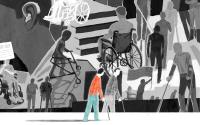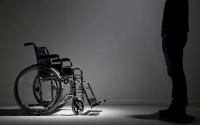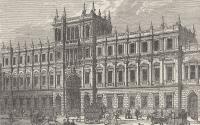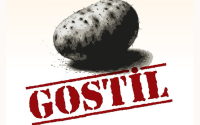Hülya Denizalp Demircan: Merhaba sevgili dinleyiciler... Farklı çevrelerden bu programın dinlendiğini, okunduğunu, yorumlar yapılıp, eleştiriler – öneriler yapıldığını görmek gerçekten beni son derece teşvik ediyor, yaptığımız işi teşvik ediyor. Bu nedenle lütfen bizi beslemeyi unutmayın. Eleştiri ve önerilerinizi daima bize iletin. Açık Radyo’nun e-posta adresi [email protected], benim özel e-posta adresim ise [email protected] . Evet, bugünkü konuğumuz Amerika’dan gelen, sivil toplum hayatında 25 senedir son derece dünya çapında aktivite gösteren Susan Davis. Hoşgeldin Susan.
Susan Davis: Merhaba.
HDD: I know you are so famous. You have lots of experience in half of your life I think. We would like to hear what you have done until now in short brief information. Of course I am sure if you were to tell it, it would be many weeks. Can you tell us who you are. What have you been doing?
| SD: Sure. I came to Istanbul to this occasion because I am the Chair of the Board of Grameen Foundation US and I came at the invitation of your civil society activists who organized a conference on micro-finance. I had the good fortune to actually meet your Prime Minister. Because of my close association and work with Grameen Bank of Bangladesh led by Prof. Mohammed Yunus, I had the good fortune in the last 20-25 years to be involved in the civil society, in citizen efforts to be able to solve social problems. I have been a part of this movement to defeat poverty using business solutions and so I have been promoting, in particular, women’s involvement in social entrepreneurship. I lived and worked in Bangladesh from 1987 to 1991. I was working with Ford Foundation and supporting all sorts of grass roots movements. | |
I worked with Women’s World Banking after that all around the world again to promote this idea of poor women changing their lives. I got involved in heading the Women’s Environment and Development Organization for five years doing global advocacy at these UN Conferences and connecting the women’s movement, the environment movement, labor and social justice movements, human rights. So I have had a privileged background. I am working right now as an advisor to the head of the International Labor Organization involved with globalization issues at the very high level but also staying connected through my work with ASHOKA as a selection panelist with grass root representatives around the world.
HDD: Bu arada bir de genç arkadaşımız var, Eda Cerrahoğlu. O da bize yaklaşık iki haftadır gönüllü çalışmaları ile programın deşifrasyonunda da yardımcı oluyor. Hoşgeldin Eda. Amerika’da hukuk okuyorsun ve, yaz aylarında burada gönüllü çalışmalar yaparak kendini dengelediğini söylemiştin, yanlış hatırlamıyorsam. Peki dengelemekten kastin ne, önce onu öğrenelim, sonra da Susan’ın konuşmasının tercümesini dinleyelim senden.
Everybody is a change maker
Eda Cerrahoğlu: Dengelemekten kastim; hukuk eğitimi çok sıkı bir eğitim, ben de bu son bir senede öğrendim. Hukuk eğitimini yaparken başka hiçbir şeye vaktimin kalmadığını, sadece gece gündüz hukuk ile ilgilendiğimi anladım. Sonra da dedim ki bu iş böyle olmayacak. Ben geldiğim zaman yazları daha insanlara yönelik, kendi belki zevklerimi tatmin edecek bir şeyler yapayım. O yüzden bir sene sıkı hukuk çalışıp yazları da değişik yerlerde sıkı gönüllü çalışıyorum.
HDD: Yani sosyal sorumluluk yaparak rahatlıyorsun. Çok enteresan.
EC: Evet, çünkü iş hukuku üzerine daha çok ihtisas yapacağım gibi görünüyor. Hem iş dünyası hem sosyal sorumluluk; dengelemek diye buna diyorum.
HDD: Peki Eda, bize Susan’ın özgeçmişi hakkında ne gibi şeyler söyleyeceksin?
EC: Susan Davis, Muhammed Yunus’un mikro-finans programı için bulunuyor İstanbul’da şu anda. 25 yıldır sivil toplum ile uğraşıyor kendisi. Bangladeş’te Muhammed Yunus ile çok yakın çalışmalar içinde. Bu mikro finans programının temeli yoksulluğu yenmek; özellikle de kadınları hedeflemiş bir program bu. 1987 ve 1991 yılları arasında Bangladeş’te yaşamış ve daha sonra da Uluslararası Kadın Bankaları’nda yine yoksul kadınları geliştirmek amacı ile çalışmış. 5 sene kadar da BM’de ve uluslararası diğer platformlarda kadın haklarını savunmuş. Kendisi bu işleri yaptığı için geçmişinin çok özel olduğunu söylüyor. Şu anda da ASHOKA’nın uluslararası platformlarda panelisti olarak görev alıyor.
different countries about volunteerism or the other solution? But before that I have to translate my question into Turkish.
Sevgili dinleyiciler İngilizce anlamakta sıkıntı çekenler için tercüme yapmakta fayda var. Gördüğünüz gibi Susan Davis’in oldukça yoğun tecrübesi var dünya çapında. O nedenle kendisine başka ülkelerde neler oluyor, gönüllü çalışmalar nasıl oluyor, esas problem ne ve uygun gördüğü çözümler nedir diye bir soru yönelttik.
SD: ASHOKA has a very simple philosophy: Everybody is a change maker. And I think this sums up what has been happening over the last 10-20-30 years around the world. There has been an explosion of people power. There are so many problems in the world today in every society and every community. Families are under stress with the economic conditions, with social conditions, with violence. The home to the street to the neighboring countries... It is easy to just feel depressed or despair about the situations. And the hopeful response is people not waiting for somebody else to solve the problems but ordinary people, extraordinary people getting involved, search for common ground solutions to these problems. Economic problems, health problems, environment problems, problems in justice and abuse of human rights… I have seen these phenomena in places different as Bangladesh and the United States. I have spent a lot of time in Egypt over the last several years and over there is an emerging civil society trying to solve their social problems. In Turkey of course it exists as well and it is very encouraging. I think the key for people to figure out how to be the change maker; to volunteer to get involved in with existing organizations is a great response but also you have seen in the last 10-20 years a great growth in the number of citizen initiatives. There are many more organizations and many more opportunities to be involved.
Protesto etmek yeterli değil
HDD: Eda istersen bu arada bir tercüme yapalım. Seni zorluyor mu bu uzunluk?
EC: Hayır iyiyim. Susan Davis diyor ki, ASHOKA’nın çok basit bir felsefesi var.
HDD: Yani ben en iyi çözüm nedir dediğim vakit ASHOKA’yı örnek gösterdi.
EC: Evet. Felsefesi “herkes değişim yaratabilir.” Kendisi de bu 25 senelik sivil topum kuruluşlarındaki tecrübelerinde bunu görmüş. Diyor ki, çok büyük bir insan gücü var dünyanın her tarafında. Çok sorun var ve bu sorunlar yüzünden insanlar belki umutsuzluğa kapılabilir ama insanların problemlerine kendi girişimleri ile sonuç bulmaya çalışmaları çok umut verici. Bunu dünyanın değişik ülkelerinde tecrübe etmiş, mesela Bangladeş’te, Mısır’da. Türkiye’de de bu çok ilerlerdi, diyor. Ve çok güzel bir şey olduğunu söylüyor bunun. En önemli olanın da insanların bu sorunlara nasıl çözüm bulacaklarını bilmelerini olduğunu düşünüyor. Diyor ki, onlara imkânlar verilmeli, kendi girişimlerine yardımcı olacak organizasyonlar bulmalılar. Ve kendisinin tecrübelerinde gördüğü, bu organizasyonların yıldan yıla sayılarının arttığı.
SD: It is a great thing when people find their voice and can express themselves. For example February 15th, it was the first time in history when you had around the world simultaneous protests against the war. Some 12 or 13 million people in cities around the world were all in unity saying they were opposed to a violent conflict and they were in favor of justice. That is civil society finding its voice.
Proposition of alternative solutions is in fact the real power of civil society and that is where the social entrepreneurs come in because finding positive solutions to real problems is the way to move forward. Right now we have people working around the world on tangible solutions to provide clean water where there is no clean water; tangible solutions to provide credit in savings facilities where people who are too poor who have no collateral need the credit to be able to create some income generation to get out of poverty; tangible solutions on how to get better health care delivered in remote and rural areas or solutions in places of crisis to provide more efficient delivery of humanitarian goods and services that are needed. This is the work of social entrepreneurs. It goes beyond protest to positive solutions.
EC: Susan Davis diyor ki, savaş oldu ama olmasa bile protesto etmek yeterli değil, sivil toplum kuruluşlarının ilerlemesi için. Yani savaşı engellemiş olsaydık bile yeterli değil. Sosyal girişimciler burada önem kazanıyor çünkü sosyal girişimciler sadece protestoda kalmıyorlar, ilerlemek için çözüm getiriyorlar gördükleri problemlere. Mesela örnekler verdi dünyadan: Bu temiz içme suyu için veya yoksulluğu yenmek için, köylere kasabalara yeterli sağlık imkânlarının ulaşması için veya felaket yerlerine yardım getirebilmek için sosyal girişimciler bu konularda protestodan daha öte ve daha önemli olan sonuçları üretiyorlar, diyor.
"A first class global social entrepreneur"
HDD: Bu anlamda, bu sıralar basında sıkça gündeme geldiği için örnek vermekte fayda olabilir: Muhammed Yunus mikro kredi önerisi ve çözümü ile sosyal girişimciler örneği veriyor, değil mi? Susan in that case, Mohammed Yunus is a good example of a social entrepeneur, am I right?
SD: Oh yes he is a first class global social entrepreneur. In fact, he was invited to be the founding member of ASHOKA’s global academy for social entrepreneurs. Mohammed Yunus has not just founded Grameen Bank and launched a movement to replicate this approach to poverty banking around the world but he has also created this family of 24 companies and organizations in Bangladesh – the largest phone company in South Asia.
HDD: Is it just for receiving the money for the Grameen Bank?
SD: No of course. It is a social enterprise. It is a company that provides cell phones to village ladies where there is no electricity; to provide cell phone to the wealthier of the villages and they use Grameen solar company to power those phones. He has a company for health services to create an efficient rural health care system so that the poor always can tap the things that work for the rich. Yunus can be a billionaire having made profit for himself like a lot of business people but instead he is a social entrepreneur and he created 4 profit companies and non-profit organizations all to work for solving social problems.
HDD: Muhammed Yunus bildiğimden de daha büyük işler başarmış galiba.
EC: Susan Davis, Muhammed Yunus’u çok önemli uluslararası bir sosyal girişimci olarak tanıttı bize. ASHOKA’nın sosyal girişimciler akademisine liderlik için bir teklif almış sanırım. Kurucularındanmış da galiba. Grameen Bankası’nın kurulması haricinde Bangladeş’te 24 şirket ve organizasyon kurduğunu söylüyor. Mesela bunlar arasında bir cep telefonu şirketi var, sağlık imkânlarını köydeki kasabadaki yoksullara iletmek için bir şirket kurmuş. Yani Muhammed Yunus’un yaptıkları anladığımız kadarı ile zenginlerin ellerinin altında olan her şeye yoksulların da ulaşabilmesi için. Susan Davis diyor ki, Muhammed Yunus çok zengin olabilirdi bu kurduğu şirketlerle ama o bu imkânları yoksulların ilerlemesi ve yoksulluktan kurtulması için kullanmış.
HDD: Extraordinary dediği bu sanırım; bizde biraz enayi veya deli diye tabir edilen kişiler oluyor galiba... Susan I think we have to finish our program, but I see, and I had thought already, that this is not enough time to listen to you and your lovely experiences and so please stay here; we are going to meet again for our next program with you. OK?
SD: Thank you so much.
(2 Temmuz 2003’te Açık Radyo’da yayınlandı. Deşifre eden: Eda Cerrahoğlu)
 Susan Davis
Susan Davis







